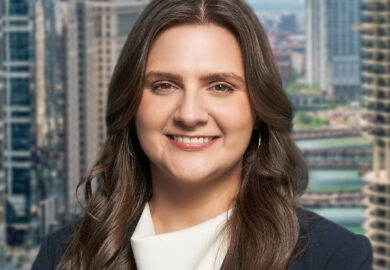Ankin Law attorney, Kayla Coates represented a lawn care worker who suffered a serious foot injury while working for a small lawn care company. The 20-year-old injured man stepped off his large riding lawn mower when it got stuck in mud. As he tried to free the mower, his foot slipped under the mower, severely fracturing several bones and damaging much of the tissue in his right foot.

He testified that he now has impaired balance, wobbles, and is unsteady on his right foot due to the shortening of his right great toe. His shoes consistently rub and irritate the closed wound on his severely disfigured foot and he still experiences pain and swelling in his foot that radiates into his right leg.
Since the small company had no workers’ compensation insurance, the Illinois Workers’ Benefit Fund stepped in on their behalf, making this an especially tough arbitration. In the end, Kayla saw that the injured lawn care worker was awarded:
- Permanent partial disability benefits at a rate of $390.00/week for 100.65 weeks
- Temporary total disability benefits of $433.33/week for 103 5/7 weeks
- Payment for all reasonable and necessary medical services
[Read the full Arbitrator Decision here)
____
Below is a summary of the medical treatment taken from the arbitration proceedings:
Initial Injury and Emergency Treatment
- Date of Injury: May 12, 2020
- Cause: Lawnmower accident
- Initial Diagnosis (PX 6, p. 82):
- Severely comminuted open fracture of the right first metatarsal
- Acute transverse fracture of right second metatarsal
- Fracture of the lateral base of the proximal phalanx of right second toe
- Degloving injury to right foot
Initial Surgery and Hospitalization
- Surgery Date: May 13, 2020
- Procedure:
- Open reduction internal fixation and external fixation of the 1st and 2nd metatarsals
- Bone fragments of 1st metatarsal extracted; cement spacer placed
- Use of wound vac and wheelchair post-op
- Hospital Stay: May 13–16, 2020
Follow-Up and Continued Treatment
- May–June 2020: Regular wound care, wound vac changes
- June 11, 2020: Evaluation for graft augmentation, flap placement, or possible amputation
- June 23, 2020: Referred to Dr. G at Orthopaedic Consultants
- Cement spacer was exposed
- Advised either toe amputation or salvage with multiple surgeries
- Petitioner opted for salvage
Subsequent Surgeries (2020)
- June 24: Cement spacer removed; debridement
- June 29: Debridement and external fixator revision
- July 3: Further debridement; new antibiotic cement spacer implanted; flap coverage by plastic surgery
- December 4: External fixator removed
- December 15: Wound clean; Petitioner cleared to return to work without restrictions
Treatment Gaps and Recurrence
- May 2021 – August 2021: Primary care visits; orthopedics referral but no surgery
- August 2021 – late 2021: Treated at hospital with pain management, boot, and MRI imaging
- No treatment in 2022: Due to lack of insurance
Recurrence & New Treatment (2023)
- May 7, 2023: ER visit for open foot wound caused by shoe rubbing
- May 10, 2023: Follow-up with Dr. Go; wound treated
- August 28, 2023: Surgery to remove cement spacer
- September 28, 2023: Discharged from care; returned to work
Work Status
- Off Work Periods:
- May 13, 2020 – December 15, 2021
- May 7, 2023 – September 28, 2023
- No wages or benefits received from Employer or other sources during these periods
Key Medical and Legal Points
- Severity and Complexity of Injuries:
- Multiple fractures, bone loss, and soft tissue trauma, with open wounds requiring complex surgical intervention.
- Long-Term Impact:
- Ongoing complications over multiple years
- Recurring wounds and pain
- Extended inability to work
- Repeated Surgeries:
- Multiple surgeries including fixation, debridement, cement spacer insertions/removals, and flap reconstruction
- Medical Necessity & Compliance:
- Petitioner followed all medical recommendations and sought treatment when financially or logistically feasible
- Financial Hardship:
- No compensation received during periods of total work disability



